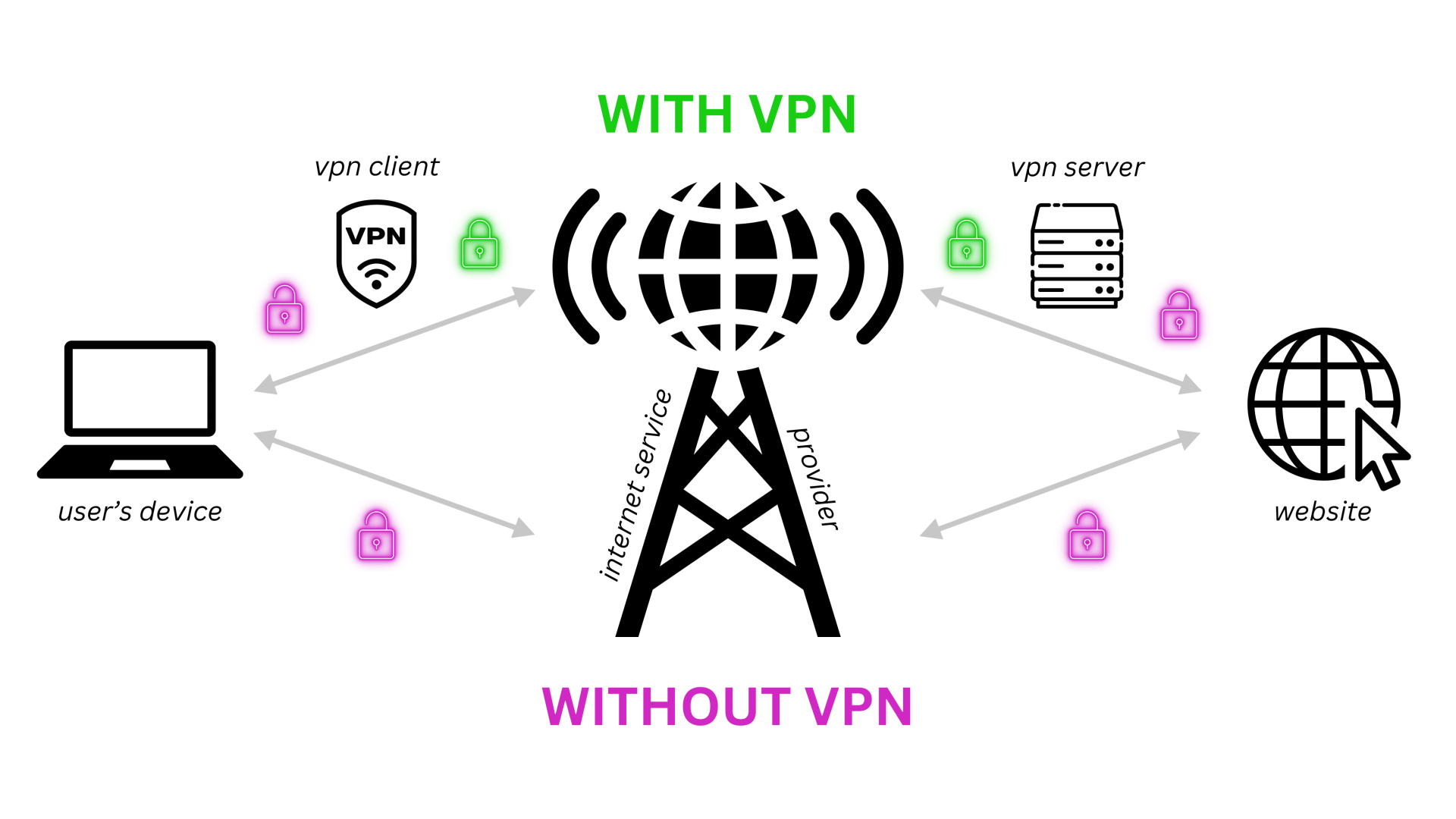In the digital age where a lot of our private information is on the internet – in public and supposedly in private storage – ensuring online privacy has become even more integral to protecting your online activity and identity. According to Cobalt’s Top Cybersecurity Statistics for 2024, there are over 2,200 cyberattacks a day (a very conservative estimate), which is one cyberattack every 39 seconds, and 95% of all digital breaches arise from preventable human error. These attacks are usually aimed at trying to get ahold of valuable personal and private information (e.g., login credentials, bank account numbers, social security numbers, etc.). In response to threats to security and privacy, Virtual Private Networks, or VPNS, have emerged as popular protection tools for online users.
What Is A VPN?
A VPN establishes a secure connection between you and the internet, acting as a protective shield against malicious hackers by anonymizing the online traffic and location of the user. The key functions and benefits of a VPN include:
- Online Privacy: VPNs encrypt – concealing data by converting it into code– all internet traffic to ensure the security of sensitive information so that no one, including your internet service provider, can monitor your online activities.
- Protection on Public Wi-Fi: VPNs encrypt your connection, preventing hackers from monitoring your online activities through public Wi-Fi networks that have a higher potential to make security vulnerable, making them prime targets. Although in the past, public Wi-Fi was notorious for its lack of security, technological developments have increased security. To ensure the encryption of your connection and overall security of your browsing, check for a lock icon next to your search bar and protect your online identity by using strong passwords and avoiding scams.
- Privacy: Although a VPN alone doesn’t guarantee full anonymity online, VPNs hide your IP address, making it difficult for anyone to trace your location or identify you online.
- Blocking Malicious Ads and Websites: Some VPNs have built-in features that block malicious websites, ads, and trackers to blacklist harmful sites before they can cause damage.
How do VPNs Work?

VPNs route all your internet traffic through one of its servers, where it is encrypted. The server then forwards the traffic to the website which acknowledges the VPN server’s IP address rather than the user’s device IP address. Redirecting the IP address allows the user’s identity and location to remain private.
Can VPNs be Bad?
Although VPNs are meant to protect the user, unless the VPN is open source, you can’t be 100% certain of its security. It is crucial to be cautious of any software especially when it is pertinent to your safety.
- Slow Internet Connection Speed: Some less-reputable VPNs can potentially slow down internet speed due to the additional time required to encrypt and decrypt data. Because traffic goes through the VPN server, rather than traffic directly between website and browser, internet browsing can slow down.
- Untrustworthy VPNs: Some less-reputable VPN providers may not uphold user privacy, sharing browsing activities with third parties.
- Blocked Websites: Some websites may block access to VPN users; however, this can sometimes be overcome by connecting to a different server in the same region.
- Account Security: Certain online services like PayPal may flag account security breaches when notified of a foreign IP address to protect against international fraudsters.
What Should I Look for In A VPN?
- Strict no-logs policy: A strict no-logs policy will not “log”, or collect and save, any personal information from your network while you are browsing.
- User-friendly apps for devices: VPNs should be able to provide proper guides, tips, and instructions about how to best use their service.
- Large server coverage: Premium VPNs will allow you to connect you to any location with servers across the globe.
- Multiple Simultaneous Connections: Premium VPNs will allow you to be able to use the VPN on multiple devices.
- Automatic kill switch: An automatic kill switch temporarily disconnects you from the VPN connection when it becomes unstable to prevent data leaks.
- 256-bit encryption: This is the highest-level encryption currently available that will protect personal information and browsing activity
- Customer Support: Whenever there is an issue or question, reputable VPNs should have a 24/7 customer support line that can help.
Why Should a person Use VPNs?
- Remote Access: This is the best and most important reason to use a VPN. WashU VPN allows off-campus access to the university’s network, resources, and databases. You can read more about the WashU VPN at https://it.wustl.edu/items/connect/
- Bypassing Geo-Restrictions: VPNs allow students to change their virtual location, allowing access to educational websites, resources, and streaming services that are geographically restricted.
- Privacy: Those working on sensitive, private topics can remain anonymous and safeguard their identity and location. VPNs also provide a secure and encrypted environment for sharing sensitive documents so that your data remains confidential.
VPNs are versatile tools and play an important role in online privacy for some users. They are also a critical tool for accessing important resources from remote locations. At WashU, please read more about the WashU VPN to learn about remote access to resources https://it.wustl.edu/items/connect/
Sources:
Cobalt.io. (2023, December 8). Top Cybersecurity Statistics for 2024. Cobalt. https://www.cobalt.io/blog/cybersecurity-statistics-2023
Electronic Frontier Foundation. (n.d.). Learn. Cover Your Tracks. https://coveryourtracks.eff.org/learn
GOOSE B.V. (2023). 9 facts about VPN that you probably didn’t know. GOOSE VPN. https://goosevpn.com/blog/9-facts-vpn-probably-didnt-know
Kitboga. (2020, May 26). VPN Companies Are Lying To You. YouTube. https://www.youtube.com/watch?v=CNRdHQJ9AMk&t=561s&ab_channel=Kitboga
vpnMentors.com. (2023). What’s A VPN? & Why You [REALLY] Need One in 2023. https://www.vpn-mentors.com/popular/vpns-101-vpnmentors-vpn-guide-newbies/?keyword=what%20is%20a%20vpn&geo=9022860&device=&cq_src=google_ads&cq_cmp=14985651282&cq_term=what%20is%20a%20vpn&cq_plac=&cq_net=g&cq_plt=gp&gclid=Cj0KCQiAuqKqBhDxARIsAFZELmL5_uDO2KNMQsg6aFGILkKFvkYpjYgn6FQqlIkL7BNxWr-88ACcP-